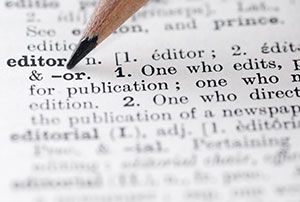If you look up: “Famous authors who self-published,” on Google you will find many. Among them:
- Margaret Atwood
- Frank Baum
- William Blake
- Robert Bly
- Beatrix Potter
- Alfred, Lord Byron
- Willa Cather
For a variety of reasons these days, there is a bit of vogue for self-publishing. One can have no objections to that. That said, I think one can find fault with self-editing. Not so much because it is wrong to go without external editing, but because one’s work suffers.

Writing as I know it, is for others, for readers. The editor is traditionally the first reader and the one who can do much to make the writing readable. While many professional editors work for a publisher, these days there are plenty of good freelance editors who can be hired.
In fact, I’ve known writers who (in secret) hire a freelance editor before they give their work to their regular editors.
Yet, while the role of an editor in publishing is thus vital, it is highly unusual for an editor to be cited publicly. In my most recent book, Loyalty, the person who designed the physical book is cited right on the copyright page, but the editor is not. The closest one comes to that is when an editor achieves such success they have been given their own imprint, as in “A Richard Jackson Book.” And there are editors who are famous in their own right. Perhaps the most famous, Maxwell Perkins, was one who edited (among others) Ernest Hemingway, F. Scott Fitzgerald, Marjorie Kinnan Rawlings, and Thomas Wolfe.
There are writers who work with one editor for their entire careers. I have a number of writer friends who have done that. I, because I have worked with many publishers, have had many.
For the most part, editors choose which books they work on, but not always. Now and again, for a variety of reasons, they are assigned books. That can be tricky. What happens when an editor does not like a book they have been assigned? Not good. On the other hand, my Crispin was purchased by one editor who then retired. The manuscript was (I believe) assigned to someone else. The book went on to win the Newbery. My very first book, Things That Sometimes Happen, had three editors: one retired, the second changed employer, and the third, I’m not sure because I never spoke to her. For another book of mine, City of Orphans, the original editor became ill and signed off. I told the publisher I didn’t think the book was done. The publisher assigned another editor to work on the book. The collaboration was splendid.
So, the relationship between editor and writer is complex. While it is often cordial, without friction, and most often productive, it can be otherwise. It can even be adversarial. A writer may have one vision of his/her book, an editor can have another. Moreover, the writer may be wrong, and the editor right. By the same token, the writer may be right, and the editor wrong. In my writing career, I have experienced both.
I have known editors who always think they know better than their writers. And the other way around. I recall one writer who described to me the emotions generated by the editor’s standard notes to be akin to the famous painting, “The Scream.”
I have no doubt there are authors who are considered just as difficult.
I was once in my editor’s office when I saw a Roald Dahl manuscript on someone’s desk. On the top page, in pencil, the following was scrawled by Dahl; “God damn it, when I write … I mean … !!”
Over my years I have heard many a discussion among writers about editors, their strengths and weaknesses. I assume editors do the same about writers. Rarely, but it has happened, I have heard an editor refer to an author as “difficult.”
This tension, which might I suppose be called “creative tension” from time to time, does exist but is seldom discussed publicly. I think that’s because the writer/editor relationship is (at its best) one that requires great trust, tact, honesty, and not least, a huge amount of truly collaborative work. Yet when I have asked editors (and I have asked) why their names are not attached to the book they will say, “Because it’s the author’s work.” Not entirely.
Indeed, the writer who works without an editor does so at their own peril.
My point here is that the writer-editor relationship is one of the key aspects of professional writing. Yet, curiously, it is rarely talked about.
It should be.